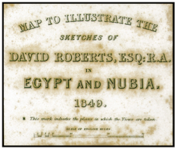CLEOPATRA'S NEEDLE.
THE most striking monuments of ancient Alexandria are the well-known Obelisks, and Pompey's Pillar. Of the former one only remains standing. They are the same which Pliny mentions as having been placed before the Temple of Cæsar, and which he supposes to have been cut and sculptured at Mesphres. In this, indeed, he is not far from the truth, since the Pharaoh, whose ovals they bear, was the third Thothmes; and it is remarkable that the names of the kings who lived about that period, the first and second Thothmes, are written in Manetho's list as Mesphra-Thothmosis. In the lateral lines are the ovals of Remeses the Great, the supposed Sesostris; and additional columns of hieroglyphics at the angles of the lower part present that of a later king, apparently Osirei II. the third successor of the great Remeses.
These Obelisks stood originally at Heliopolis, and were brought to Alexandria by one of the Cæsars, perhaps Julius, since tradition has attached to them the title of Cleopatra’s Needles. They are of red granite of Syene, like most of the Obelisks of Egypt, and are nearly sixty paces apart. The standing Obelisk is about seventy feet high, and seven feet seven inches square at its base. That which has been thrown down, and lies close to its pedestal, is mutilated, and only sixty-six feet in length, but otherwise of the same dimensions as that which id erect. It was given to the English Government by Mohammed Ali, who offered even to transport it free of expense to the shore, and put it on board any vessel or raft which might be sent to remove it;* but, though the idea of removing it was long entertained, and the English Government has often been reproached for not bringing it away, as a trophy of the glorious termination of the war of 1801 in Egypt, the project appears to have been abandoned.
* This has been greatly misrepresented by Stevens, an American author, in his incidents of Travel. He says it was taken down many years ago “by the English, for the purpose of being carried to England, but the Pacha prevented it!”


